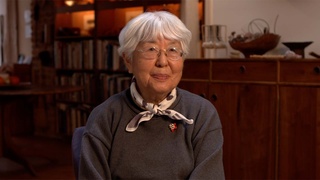Interviews
Camp as a positive thing
Everything in camp could be a positive thing. Every person you meet, you know, that you never met before or you hear what town they came from, or if they were farmers or fisherman or what, you know. I mean, to me I didn’t think of that experience as being such a negative thing. I thought, everybody goes through changes through life—after all, look at what our parents, they left their home country and came here. And here, we just went from our hometown to this camp that I didn’t think… and I had told all the Sunday school kids, “Your life hasn’t even begun yet. You don’t even know what you’re gonna go through five years from now, ten years from now, twenty years from now…” And so, I mean, I thought it’s good to prepare them that this isn’t the worst thing that could happen. And then, of course, afterward when I learned about slavery and the way blacks were treated, I thought to myself, “My God! I mean, how can we complain where others have been treated so much worse…”
Date: June 16, 2003
Location: California, US
Interviewer: Karen Ishizuka, Akira Boch
Contributed by: Watase Media Arts Center, Japanese American National Museum.
Explore More Videos

Captured by Guerillas after bombing of Pearl Harbor
(b. 1938) Philipines-born hikiagesha who later migrated to the United States.

Grandfather picked up by US Army
(b. 1952) Former banking executive, born in Hawaii

Father's business partner operated their farming business during WWII
(b. 1935) Sansei businessman.

Father was convinced the constitution would protect him
(b. 1935) Sansei businessman.


The lack of discussion about family’s incarceration in Amache
Sansei judge for the Superior Court of Los Angeles County in California


Passing Time in the Camps with Baton Twirling
(b. 1932) Nisei American stage, film, and TV actress

Being Confused about Racial Identity in Postwar United States
(b. 1932) Nisei American stage, film, and TV actress

Her brother’s reasons as a No-No Boy
(b. 1923) Japanese American poet, activist

Her grandfather was pressured to teach Japanese
Sansei judge on the Superior Court of Los Angeles County in California

Neighbor took care of her mother after grandfather was taken by FBI
Sansei judge on the Superior Court of Los Angeles County in California

Immediately after the bombing
(b. 1938) Japanese American. Hiroshima atomic bomb survivor

Other family members not as lucky
(b. 1938) Japanese American. Hiroshima atomic bomb survivor

His parents had little hope that he had survived the atomic bomb
(b. 1938) Japanese American. Hiroshima atomic bomb survivor
